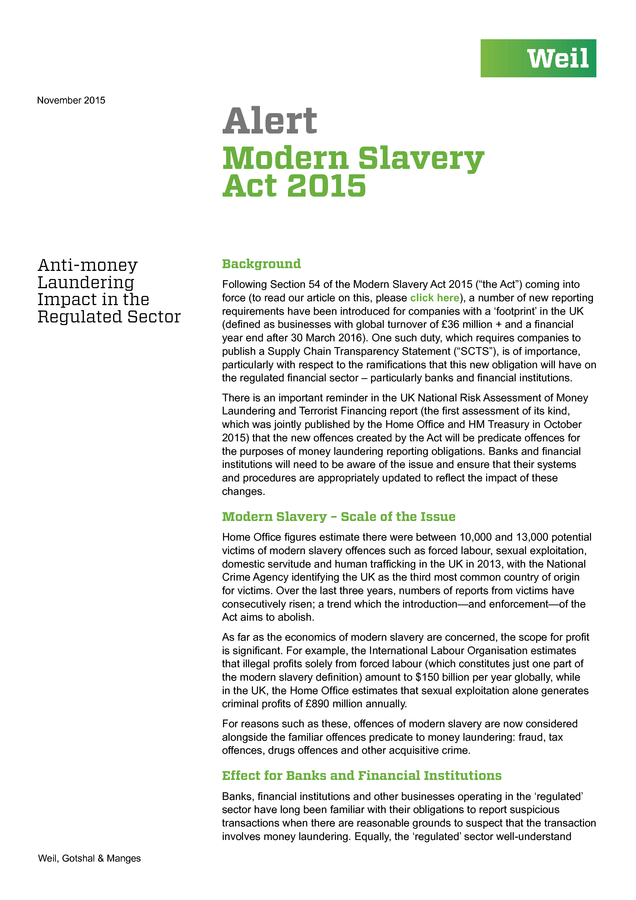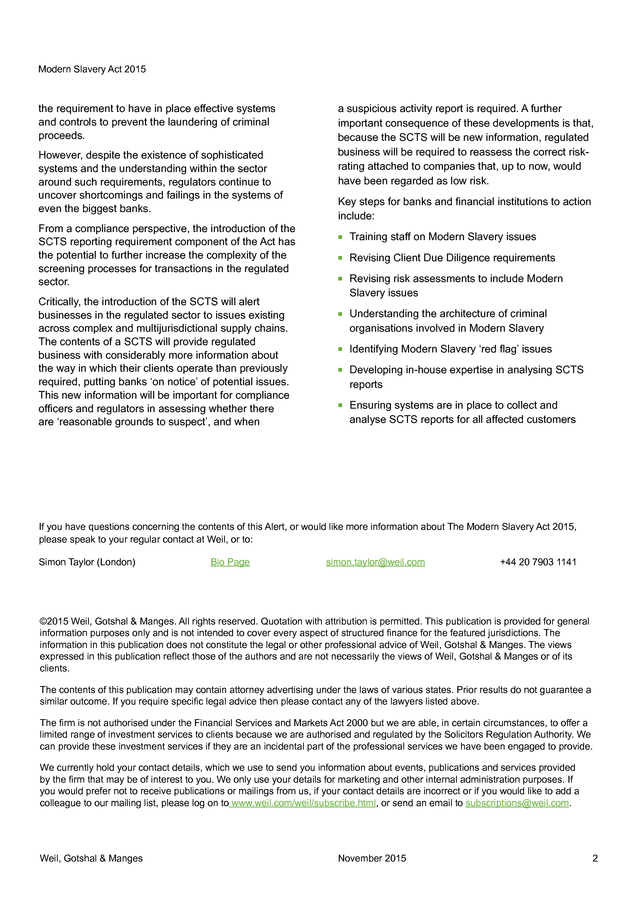Description
November 2015
Alert
Modern Slavery
Act 2015
Anti-money
Laundering
Impact in the
Regulated Sector
Background
Following Section 54 of the Modern Slavery Act 2015 (“the Act”) coming into
force (to read our article on this, please click here), a number of new reporting
requirements have been introduced for companies with a ‘footprint’ in the UK
(defined as businesses with global turnover of £36 million + and a financial
year end after 30 March 2016). One such duty, which requires companies to
publish a Supply Chain Transparency Statement (“SCTS”), is of importance,
particularly with respect to the ramifications that this new obligation will have on
the regulated financial sector – particularly banks and financial institutions.
There is an important reminder in the UK National Risk Assessment of Money
Laundering and Terrorist Financing report (the first assessment of its kind,
which was jointly published by the Home Office and HM Treasury in October
2015) that the new offences created by the Act will be predicate offences for
the purposes of money laundering reporting obligations. Banks and financial
institutions will need to be aware of the issue and ensure that their systems
and procedures are appropriately updated to reflect the impact of these
changes.
Modern Slavery – Scale of the Issue
Home Office figures estimate there were between 10,000 and 13,000 potential
victims of modern slavery offences such as forced labour, sexual exploitation,
domestic servitude and human trafficking in the UK in 2013, with the National
Crime Agency identifying the UK as the third most common country of origin
for victims. Over the last three years, numbers of reports from victims have
consecutively risen; a trend which the introduction—and enforcement—of the
Act aims to abolish.
As far as the economics of modern slavery are concerned, the scope for profit
is significant.
For example, the International Labour Organisation estimates that illegal profits solely from forced labour (which constitutes just one part of the modern slavery definition) amount to $150 billion per year globally, while in the UK, the Home Office estimates that sexual exploitation alone generates criminal profits of £890 million annually. For reasons such as these, offences of modern slavery are now considered alongside the familiar offences predicate to money laundering: fraud, tax offences, drugs offences and other acquisitive crime. Effect for Banks and Financial Institutions Banks, financial institutions and other businesses operating in the ‘regulated’ sector have long been familiar with their obligations to report suspicious transactions when there are reasonable grounds to suspect that the transaction involves money laundering. Equally, the ‘regulated’ sector well-understand Weil, Gotshal & Manges . Modern Slavery Act 2015 the requirement to have in place effective systems and controls to prevent the laundering of criminal proceeds. However, despite the existence of sophisticated systems and the understanding within the sector around such requirements, regulators continue to uncover shortcomings and failings in the systems of even the biggest banks. From a compliance perspective, the introduction of the SCTS reporting requirement component of the Act has the potential to further increase the complexity of the screening processes for transactions in the regulated sector. Critically, the introduction of the SCTS will alert businesses in the regulated sector to issues existing across complex and multijurisdictional supply chains. The contents of a SCTS will provide regulated business with considerably more information about the way in which their clients operate than previously required, putting banks ‘on notice’ of potential issues. This new information will be important for compliance officers and regulators in assessing whether there are ‘reasonable grounds to suspect’, and when a suspicious activity report is required. A further important consequence of these developments is that, because the SCTS will be new information, regulated business will be required to reassess the correct riskrating attached to companies that, up to now, would have been regarded as low risk. Key steps for banks and financial institutions to action include: „„ Training staff on Modern Slavery issues „„ Revising Client Due Diligence requirements „„ „„ „„ „„ „„ Revising risk assessments to include Modern Slavery issues Understanding the architecture of criminal organisations involved in Modern Slavery Identifying Modern Slavery ‘red flag’ issues Developing in-house expertise in analysing SCTS reports Ensuring systems are in place to collect and analyse SCTS reports for all affected customers If you have questions concerning the contents of this Alert, or would like more information about The Modern Slavery Act 2015, please speak to your regular contact at Weil, or to: Simon Taylor (London) Bio Page simon.taylor@weil.com +44 20 7903 1141 ©2015 Weil, Gotshal & Manges. All rights reserved. Quotation with attribution is permitted.
This publication is provided for general information purposes only and is not intended to cover every aspect of structured finance for the featured jurisdictions. The information in this publication does not constitute the legal or other professional advice of Weil, Gotshal & Manges. The views expressed in this publication reflect those of the authors and are not necessarily the views of Weil, Gotshal & Manges or of its clients. The contents of this publication may contain attorney advertising under the laws of various states.
Prior results do not guarantee a similar outcome. If you require specific legal advice then please contact any of the lawyers listed above. The firm is not authorised under the Financial Services and Markets Act 2000 but we are able, in certain circumstances, to offer a limited range of investment services to clients because we are authorised and regulated by the Solicitors Regulation Authority. We can provide these investment services if they are an incidental part of the professional services we have been engaged to provide. We currently hold your contact details, which we use to send you information about events, publications and services provided by the firm that may be of interest to you.
We only use your details for marketing and other internal administration purposes. If you would prefer not to receive publications or mailings from us, if your contact details are incorrect or if you would like to add a colleague to our mailing list, please log on to www.weil.com/weil/subscribe.html, or send an email to subscriptions@weil.com. Weil, Gotshal & Manges November 2015 2 .
For example, the International Labour Organisation estimates that illegal profits solely from forced labour (which constitutes just one part of the modern slavery definition) amount to $150 billion per year globally, while in the UK, the Home Office estimates that sexual exploitation alone generates criminal profits of £890 million annually. For reasons such as these, offences of modern slavery are now considered alongside the familiar offences predicate to money laundering: fraud, tax offences, drugs offences and other acquisitive crime. Effect for Banks and Financial Institutions Banks, financial institutions and other businesses operating in the ‘regulated’ sector have long been familiar with their obligations to report suspicious transactions when there are reasonable grounds to suspect that the transaction involves money laundering. Equally, the ‘regulated’ sector well-understand Weil, Gotshal & Manges . Modern Slavery Act 2015 the requirement to have in place effective systems and controls to prevent the laundering of criminal proceeds. However, despite the existence of sophisticated systems and the understanding within the sector around such requirements, regulators continue to uncover shortcomings and failings in the systems of even the biggest banks. From a compliance perspective, the introduction of the SCTS reporting requirement component of the Act has the potential to further increase the complexity of the screening processes for transactions in the regulated sector. Critically, the introduction of the SCTS will alert businesses in the regulated sector to issues existing across complex and multijurisdictional supply chains. The contents of a SCTS will provide regulated business with considerably more information about the way in which their clients operate than previously required, putting banks ‘on notice’ of potential issues. This new information will be important for compliance officers and regulators in assessing whether there are ‘reasonable grounds to suspect’, and when a suspicious activity report is required. A further important consequence of these developments is that, because the SCTS will be new information, regulated business will be required to reassess the correct riskrating attached to companies that, up to now, would have been regarded as low risk. Key steps for banks and financial institutions to action include: „„ Training staff on Modern Slavery issues „„ Revising Client Due Diligence requirements „„ „„ „„ „„ „„ Revising risk assessments to include Modern Slavery issues Understanding the architecture of criminal organisations involved in Modern Slavery Identifying Modern Slavery ‘red flag’ issues Developing in-house expertise in analysing SCTS reports Ensuring systems are in place to collect and analyse SCTS reports for all affected customers If you have questions concerning the contents of this Alert, or would like more information about The Modern Slavery Act 2015, please speak to your regular contact at Weil, or to: Simon Taylor (London) Bio Page simon.taylor@weil.com +44 20 7903 1141 ©2015 Weil, Gotshal & Manges. All rights reserved. Quotation with attribution is permitted.
This publication is provided for general information purposes only and is not intended to cover every aspect of structured finance for the featured jurisdictions. The information in this publication does not constitute the legal or other professional advice of Weil, Gotshal & Manges. The views expressed in this publication reflect those of the authors and are not necessarily the views of Weil, Gotshal & Manges or of its clients. The contents of this publication may contain attorney advertising under the laws of various states.
Prior results do not guarantee a similar outcome. If you require specific legal advice then please contact any of the lawyers listed above. The firm is not authorised under the Financial Services and Markets Act 2000 but we are able, in certain circumstances, to offer a limited range of investment services to clients because we are authorised and regulated by the Solicitors Regulation Authority. We can provide these investment services if they are an incidental part of the professional services we have been engaged to provide. We currently hold your contact details, which we use to send you information about events, publications and services provided by the firm that may be of interest to you.
We only use your details for marketing and other internal administration purposes. If you would prefer not to receive publications or mailings from us, if your contact details are incorrect or if you would like to add a colleague to our mailing list, please log on to www.weil.com/weil/subscribe.html, or send an email to subscriptions@weil.com. Weil, Gotshal & Manges November 2015 2 .













